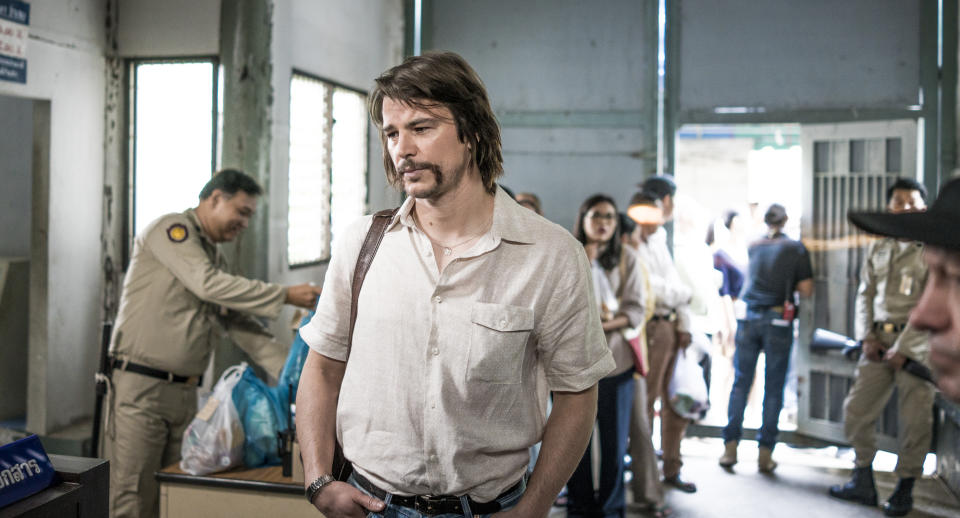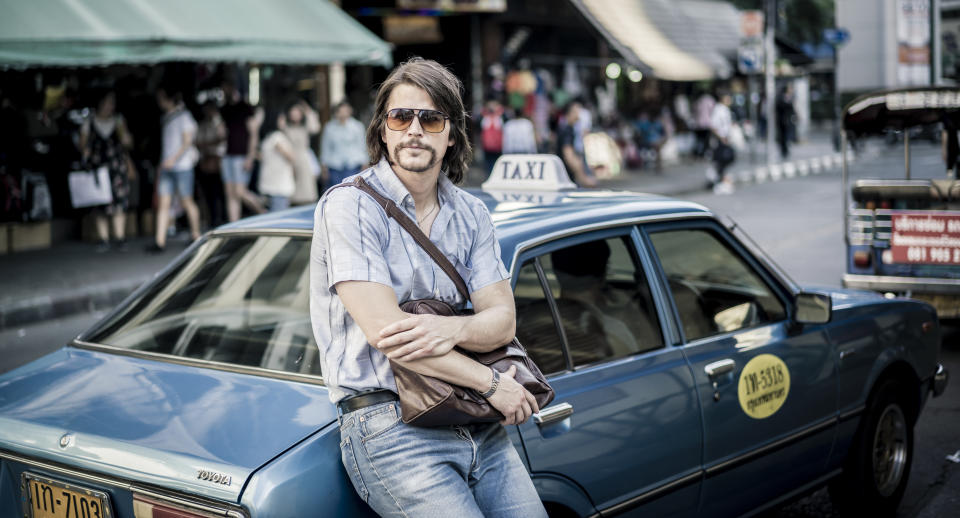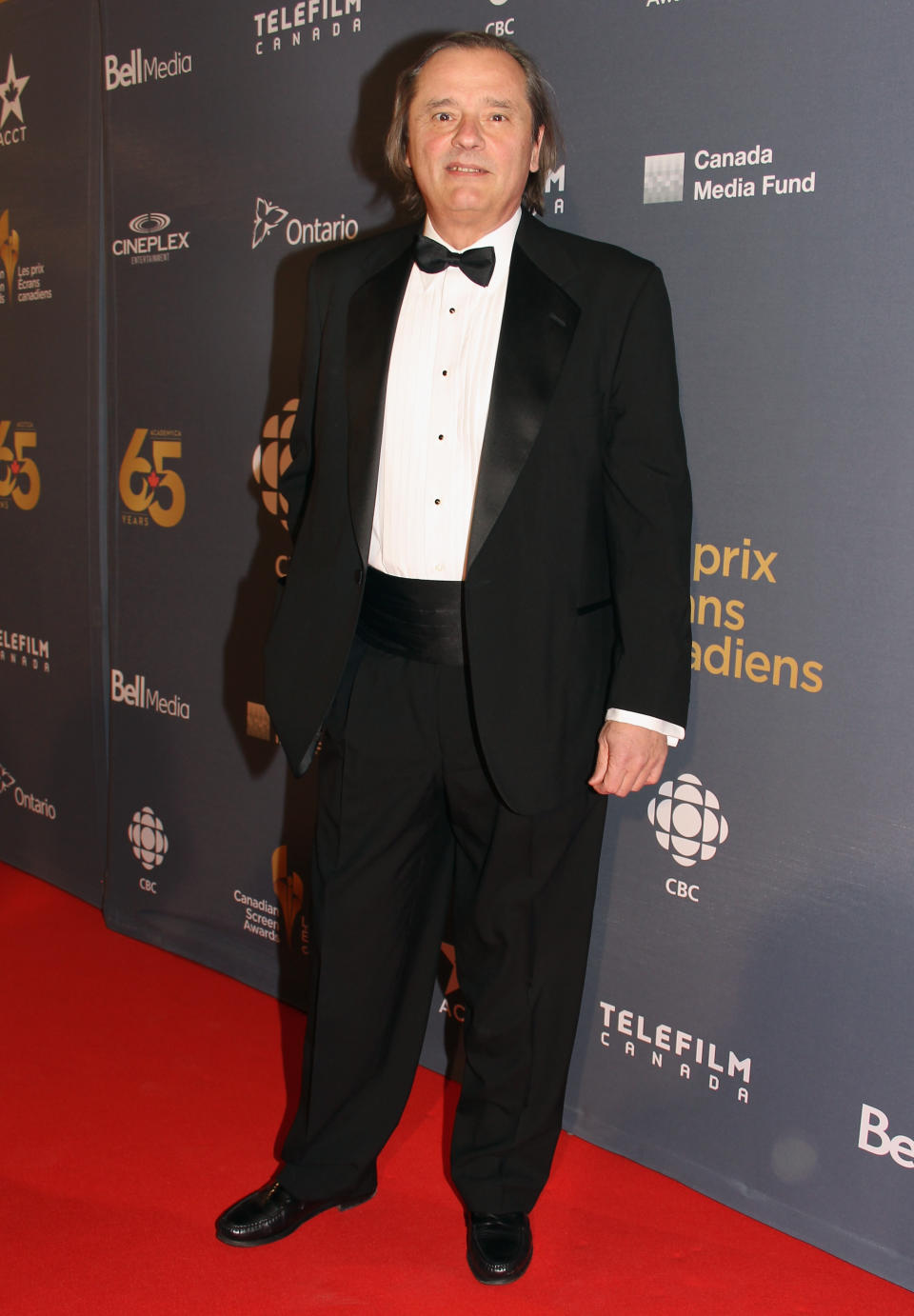Target Number One’s Josh Hartnett on why he chooses 'passion projects' (exclusive)
Watch: Josh Hartnett stars in the trailer for Target Number One
At the start of the naughties, he was tipped to be the next big thing, with a resume to prove his point. Josh Hartnett had barely turned 20 when he made his breakout appearance in Sofia Coppola’s The Virgin Suicides and followed it up with Michael Bay’s Pearl Harbor and Ridley Scott’s Black Hawk Down. But then one of the world’s hottest young actors changed course, opting for independent movies like Lucky Number Slevin and The Black Dahlia and turning down the chance to play Superman in Bryan Singer’s 2006 re-boot. Nowadays, as he explains to Yahoo Movies UK, he follows his own instincts, seeking out passion projects. “I always love a passionate film maker,” he said. “A passionate film maker – their passion project – is the film I always want to work on.”
For Hartnett, his latest, Target Number One (available on digital from the start of next month) fits that description perfectly. Based on the true story of a heroin addict convicted of drugs dealing and sentenced to 100 years in a Thai prison, it sees Hartnett play the real life journalist, Victor Malarek, who both revealed the story and the cops responsible for the wrongful imprisonment.
It was director Daniel Roby’s commitment to the project that convinced Hartnett to take the role. “His passion was instantly apparent. He’s a super smart guy and he’d been working on the script and preparing the film for about five or six years before he sent me the script. He had run into finance issues but he had really put together something extraordinary and he was incredibly enthusiastic at the prospect of making of the film and he told me everything I felt I needed to hear.”
Read more: Why Josh Hartnett turned down Superman

Meeting Malarek himself was the icing on the cake. “I was taken with his clarity of purpose as a journalist and something I was surprised to find – that he has a very soft temperament. If you see videos of him or you read his books he comes across as somebody with a lot of bravado and a strong character - which is he is - but there’s a soft side to him which is way more apparent in person and I thought that blended in with the material very well and then I became very excited about playing the character.”
Filming wrapped on Hartnett’s most recent project, Wrath Of Man, in early September. Directed by Guy Ritchie and originally known as Cash Truck, it sees Hartnett co-starring with Jason Statham and Scott Eastwood. Slated for a US release in mid-January, there’s no date scheduled as yet for the UK. And, because of Ritchie’s unique way of working, Hartnett is intrigued to see how his character in the film ends up. “Guy will take a scene and then completely invert it on the day and will end up shooting something that is entirely different from what was intended and it works. So what I shot was varied and I’m curious to see how my character turns out.”

Yahoo Movies UK: Congratulations on the film, which was inspired by actual events. Had you come across the story before?
Before I read the script, no. Apparently it was a pretty big story in the late 80s in Canada but I was young then. But also it didn’t cross the border and, as far as I can tell, wasn’t much of a story in the US. I didn’t see any stories on it. So when I read the script, it was surprising that something like this could happen and not be reported on extensively. At the same time, the nature of the story explains that because it is about power and corruption and it took this one journalist to really cut across this story and save this guy’s life, essentially.
When I read the script I was in New York at the time. I’d just finished a project and my agent sent me this script, but I didn’t know anything about the director’s (Daniel Roby) work and it was in Canada so I wondered if this would translate. And then I spoke to the director and his passion was instantly apparent. He’s a super smart guy and he’d been working on the script and preparing the film for about five or six years before he sent me the script. He had run into finance issues but he had really put together something extraordinary and he was incredibly enthusiastic at the prospect of making of the film and he told me everything I felt I needed to hear.

I always love a passionate film maker. A passionate film maker – their passion project - is the film I always want to work on. And then he asked me to come up to Toronto to meet the real character, Victor Malarek. It’s an hour’s flight from New York and we spent the day together. Victor showed me around, showed me The Mail, I met some of his old colleagues, we went to his house and he showed me pictures of his kids and himself and his family during that time period and gave me a sense of what it was like for them at that time. We had an interesting day and I was taken with his clarity of purpose as a journalist and something I was surprised to find – that he has a very soft temperament. If you see videos of him or you read his books he comes across as somebody with a lot of bravado and a strong character - which is he is - but there’s a soft side to him which is way more apparent in person and I thought that blended in with the material very well and then I became very excited about playing the character.
So what did he think of your portrayal? I’m thinking particularly of the way you looked. You have a very distinctive moustache, which reminded me of Duke Caboom in Toy Story 4!
(Laughs). Well, we shot this before that came out! (Laughs). I didn’t take my look from Keanu! That is what Victor looked like at the time. I didn’t take any liberties. It was his hairstyle and his moustache and even the chain around his neck and the shirts he was wearing – it’s what he was wearing at the time. He was a self-styled rebel and he stood out to everyone even then.

Your part of the story is just one thread in something more complicated so you’re not the star, you’re part of an ensemble piece and I wondered how much that was part of the film’s appeal.
I’m never really worried about how big my part is in a movie. It’s the passion of the director, really. I’ve done a lot of ensemble work over the years and I don’t think of myself as a star – that’s not my interest in making films. So it really didn’t register in a positive or negative way, it was just part of the script. It needed to tell all three of the storylines in order to make the piece as complex as it needed to be.
Read more: Everything new to Netflix in November 2020
If it was just a story about a crusading journalist who was having a tough time dealing with his own family’s potentially dangerous situation, I think that story’s been told before. And even a two handed story like that has been told quite a few times. But that third element, that allows us to see all the little things that the police did which lead them to do this rather horrible thing to this guy, seeing the way that those minute details piled up was important and I think it added to the rest of the story. And it also speaks about how the nature of corruption seeps in or how the abuse of power can sneak in to a situation where a person who is in a position of power thinks they’re doing the right thing to a certain extent and then makes a couple of small exemptions for themselves in order to get what they need and then it just snowballs. I thought that side of the story was what drove the film and made it tick along and made the stakes high.

You’ve been working pretty much non-stop, until everything stopped recently, and you seem to have been doing mainly independent productions. Is that a deliberate decision of yours? Are the better roles there?
I’ve been working in independent films since 1997 – I’ve only done a few studio films - so for me it’s not really any different but some of the studio films are the ones that people know me for. But some of the films that I’ve done which have been independent and then picked up by a studio are the ones that people like most so it’s the same for me. I do feel I’m maturing as a human being and I feel a little bit more confident in choosing the smaller roles and the smaller films. I’ve always had that and I always tried to do that anyway, but I used to run into a lot of conflict with people, especially agents and managers and people like that, people in Hollywood who wanted me to do something else, but that conflict doesn’t bother me any more. I just follow my own instincts.
One film which you might describe as being closer to a studio film is Wrath Of Man (originally known as Cash Truck), which you’ve been working on with Guy Richie. Has that been affected by the lockdown?
I don’t know that it has. If you’ve seen the way that Guy works, he’s a very signature director because he works in a way that is very much like this kind of film because he’s telling the story. It’s not a committee of people behind the story, it’s Guy and Guy changes the dialogue and makes it in to a piece that is much more interesting than what’s on the page and it feels very much like his kind of film. As far as the movie goes and whether or not it will be delayed, that’s anybody’s guess because now it’s in post-production and I don’t know what’s going to happen with that.
What can you tell me about your character in the film?
I don’t know how much I can divulge about it. It’s obviously about an armoured truck heist that’s based on a French film. It’s hard to say about my character because Guy will take a scene and then completely invert it on the day and will end up shooting something that is entirely different from what was intended and it works and we move from there. So what I shot was varied and I’m curious to see how my character turns out.
Target Number One is on digital from Monday, 2 November.

 Yahoo Movies
Yahoo Movies 
